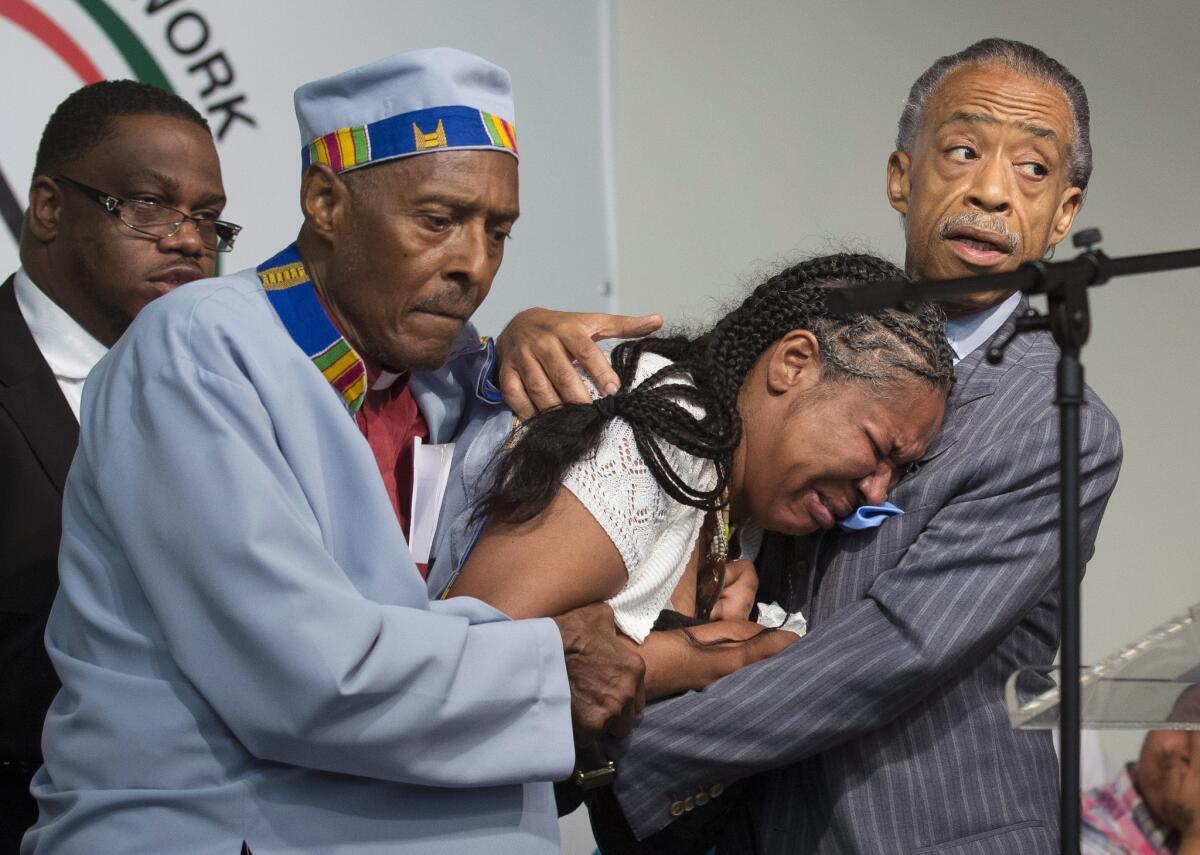Before Ferguson: Deaths of other black men at hands of police

- Share via
Reporting from New York — Amadou Diallo. Manuel Loggins Jr. Ronald Madison. Sean Bell. Eric Garner. And now, Michael Brown.
All of them were black men who died at the hands of law enforcement officers.
They are a handful of such cases since 1999, when Diallo, an unarmed man standing in a New York City doorway, was gunned down by cops who erroneously thought he had a gun.
Brown, who was shot dead by a police officer in Ferguson, Mo., on Saturday, is the latest victim of what civil rights advocates say is law enforcement’s tendency to be overly aggressive when dealing with black males.
There is no federal database that tracks the numbers of people of any race killed by police in the United States. Some individuals and groups have compiled their own databases, using information from media and law enforcement reports. They include The Root and Hiphopandpolitics.com.
Here is a look at some of the most famous cases involving black men who died at the hands of police, and the aftermath of the shootings.
Amadou Diallo was an immigrant from the west African nation of Guinea when he was hit with 19 bullets fired by four New York City police officers. It was before dawn on Feb. 4, 1999.
The policemen, none in uniform, thought Diallo fit the description of a man wanted for a series of rapes. They said they identified themselves as officers as they approached Diallo. When Diallo reached into a pocket to pull out his wallet, they opened fire, saying they feared he was reaching for a gun. Diallo was unarmed.
A grand jury indicted the officers on charges of second-degree murder and reckless endangerment. A jury acquitted all of them. Diallo’s family sued the city and settled for $3 million.
Manuel Loggins Jr. was a 31-year-old Marine sergeant and a father of three when he was killed by an Orange County sheriff’s deputy on Feb. 7, 2012. The deputy approached Loggins after Loggins crashed through a gate of San Clemente High School about 4:40 a.m., with two of his daughters inside his SUV.
According to the sheriff’s department account, Loggins left the vehicle, then returned to it, ignored orders to show his hands and displayed a “mean” expression. The sheriff’s deputy, who said he feared for the girls’ safety, fired three shots through the window, killing Loggins as his 9-year-old and 14-year-old daughters watched.
The deputy was not charged. Loggins’ family sued and settled for $4.4 million last spring.
Ronald Madison was one of two victims of a New Orleans police shooting on the Danziger Bridge in the days after Hurricane Katrina caused flooding across the city. Madison, 40, was mentally disabled. He was unarmed when he was shot in the back on Sept. 4, 2005. Madison and a 17-year-old named James Brissette were killed; four other people, all members of the same family, were wounded.
Prosecutors said the group was out walking in search of food and supplies in the wake of the hurricane. Authorities said a group of police opened fire on the unarmed individuals and tried to cover up what they had done by claiming they had been shot at.
Five New Orleans police officers pleaded guilty to obstructing justice in connection with the cover-up. Another five were convicted of civil rights violations and sentenced in 2012 to terms ranging from six to 65 years in prison.
Sean Bell was due to be married the morning after his fatal encounter with New York City police officers on Nov. 25, 2006. Bell, 23, was behind the wheel of a car outside a Queens strip club where his bachelor party had been held. Police, including plainclothes officers who had been in the club, said they approached Bell amid concerns that someone in his party had a gun.
Officers opened fire, saying Bell had rammed his car into one of them. They said they had identified themselves as officers and showed their badges, an account disputed by some witnesses in a subsequent trial. Bell was shot in the neck and torso and died. Two friends in his car were shot but survived.
Three police officers were indicted on charges ranging from manslaughter to reckless endangerment. They were acquitted in 2008, but all were fired or forced to resign after the police department concluded they had acted improperly. A lawsuit filed by the victims’ families was settled for $7 million.
Ramarley Graham was 18 when police entered his Bronx apartment without a warrant and shot him inside a bathroom on Feb. 2, 2012. Surveillance videos from the police pursuit showed Graham walking into the building, then police officers going to the building’s door and kicking it in.
They then ran upstairs to Graham’s apartment. One of them shot Graham once in the chest. The officer said he thought Graham was armed, based on conversations he said heard on his police radio. A bag of marijuana was found near Graham, but no weapon.
A judge threw out a manslaughter indictment against the officer who shot Graham on a technicality. A second grand jury failed to indict the officer, saying there was insufficient evidence to charge him. Graham’s family and local lawmakers have called for the Justice Department to investigate.
Eric Garner, 43, died on July 17, 2014, after a police officer in Staten Island placed him in an illegal chokehold during an encounter on the sidewalk, where police said Garner was selling illegal cigarettes. A bystander shot video showing Garner’s final moments, and it quickly fueled major protests and demands that the officers involved face criminal charges.
The city’s medical examiner ruled Garner’s death a homicide because of the compression of his neck and chest. Two officers face an internal investigation in connection with Garner’s death. The one who applied the chokehold was put on modified duty, meaning he was stripped of his gun and badge.
Neither has been charged with a crime, and police say Garner’s poor health and his refusal to cooperate with officers contributed to his death. Police Commissioner William J. Bratton ordered a review of police training techniques in the wake of Garner’s death.
Follow @TinaSusman for national news
More to Read
Sign up for Essential California
The most important California stories and recommendations in your inbox every morning.
You may occasionally receive promotional content from the Los Angeles Times.











